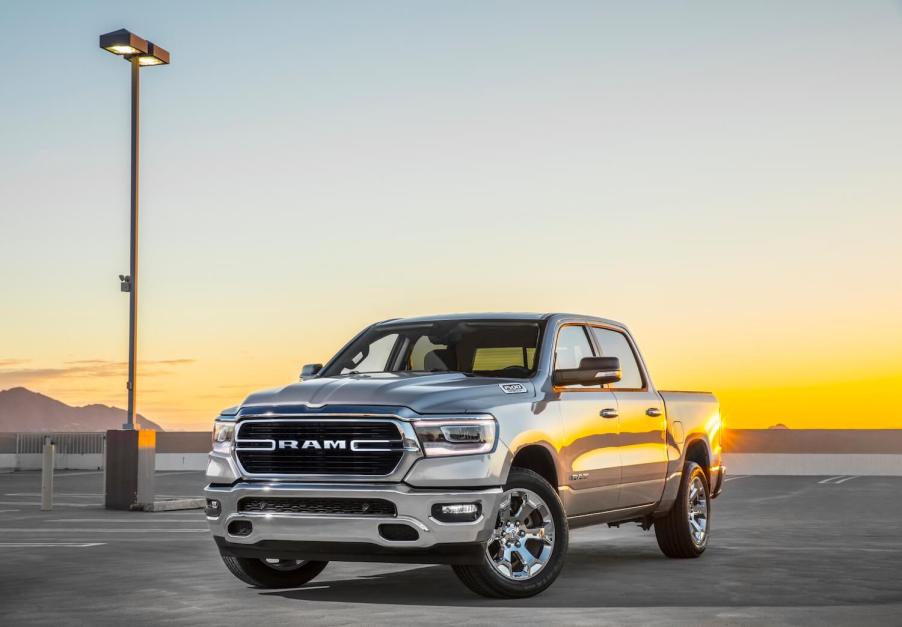
What Breaks on Ram 1500 Pickup Trucks the Most?
The 5th gen Ram 1500 has been around since 2019. Owners putting a lot of miles on their trucks may wonder which major drivetrain components will break first. Hundreds of 4th gen Ram 1500 owners reported broken manifold bolts. So Ram stiffened these bolts for the 5th generation 1500, but now owners are reporting the manifold itself breaking. Other common problems include a leaky rear window and coolant leaks. Read on for more details and the lowdown on how one Ram owner got his 2019 to 190,000 miles, still running strong.
What causes Ram manifold bolts to break?
Because a manifold catches the exhaust exiting the engine, it gets very hot. Because it is not part of the engine block, it cools down fairly quickly. This cycle can cause the manifold or its bolts to crack.

One excellent option is to replace a cracked, stock Ram 1500 manifold with aftermarket exhaust headers. These new exhaust pipes are better at dissipating heat and are often built to a higher standard than a stock Ram exhaust manifold.
But if your truck is under warranty, Ram will replace your cracked manifold with a stock one for free. In this case, a second stock manifold might be your most cost-effective option.
When should I change my Ram 1500 transfer case fluid?
Ram recommends you begin inspecting your 5th gen 1500’s transfer case fluid as early as 30k miles. The automaker adds that you must change it more often if you are towing.

Justin Wheeler is a technician who inspects the automated diesel engines which run machinery such as heavy pumps. His job requires traveling all over the country with a truckful of tools. Wheeler is a dedicated Ram truck fan and has put 190k miles on his 2019 Ram 1500 Limited. He has documented how the truck is holding up on his YouTube channel, and you can see his videos at the bottom of this article.
Wheeler began hearing a loud “clunk” when he shifted from reverse to drive. He first troubleshot the transmission but discovered it was fine. He took the truck in to have the transfer case serviced for a second time at 180,000 miles (the first was at 100k) and found the fluid was worn out and broken down. But this servicing did nothing to reduce the noise.
Wheeler suspects that the chain in the transfer case has stretched. As annoying as the noise is, the Ram 1500 is still fully operational, so Wheeler continues to drive it as-is.
What breaks the most on Ram 1500 pickup trucks?
In addition to exhaust manifold cracks, hundreds of Ram 1500 owners report their rear window seal leaking, while hundreds more have experienced various coolant leaks.

The most common place for Ram 1500s to leak coolant is a seam between the radiator’s aluminum body and its plastic uprights. Another common place is the seal between the water pump and the engine block. A third place Ram 1500s leak coolant is the radiator cap itself.
Find out what causes the infamous Ram coolant leak.
5th-gen Ram 1500 maintenance intervals
Broken manifolds and coolant leaks can be frustrating. But the good news is that the Ram 1500’s V8 engine and automatic transmission are known for lasting a long time–when the above problems are dealt with promptly.

Our Motorbiscuit chart of Ram 1500 service intervals is one of the more comprehensive, and conservative, around. That’s because we combined the official Ram recommendations (via Junek’s Ram dealership) and additional suggestions from CarEdge.com. See the full chart below:
| Mileage | Service |
| 8k | Oil change, tire rotation |
| 16k | Oil change, tire rotation |
| 20k | Inspect brake pads, tie rods, and all front suspension components |
| 24k | Oil change, tire rotation |
| 30k | Inspect brakes, front suspension components, CV joints, transfer case fluid, and the condition of the transfer case and axle |
| 32k | Oil change, tire rotation, air filter replacement, spark plug replacement |
| 40k | Oil change, tire rotation |
| 48k | Oil change, tire rotation, spark plug replacement |
| 56k | Oil change, tire rotation |
| 60k | Inspect brakes and suspension components. Check and/or replace: transmission fluid, engine coolant, transfer case fluid, and brake fluid. Inspect all filters. |
| 64k | Oil change, tire rotation, air filter replacement, spark plug/wires replacement |
| 72k | Oil change, tire rotation |
| 80k | Oil change, tire rotation, cooling system flush |
| 88k | Oil change, tire rotation |
| 96k | Oil change, tire rotation, air filter replacement, spark plug/wires replacement |
| 100k | Inspect brakes and suspension components and CV joints. Check and/or replace: transmission fluid, engine coolant, transfer case fluid, and brake fluid. Inspect all filters. |
| 104k | Oil change, tire rotation, cooling system flush |
| 112k | Oil change, tire rotation |
| 120k | Oil change, tire rotation, serpentine/drive belt replacement, transmission fluid service, transfer case fluid service Inspect brakes and suspension components. Check and/or replace engine coolant and brake fluid |
| 128k | Oil change, tire rotation, air filter replacement, spark plug/wires replacement |
| 136k | Oil change, tire rotation |
| 144k | Oil change, tire rotation, spark plug replacement, cabin air filter replacement |
Next, read about the top Ram 1500 problems according to a mechanic, or see other problems Justin Wheeler has had with his high mileage 5th gen Ram in the video below:







